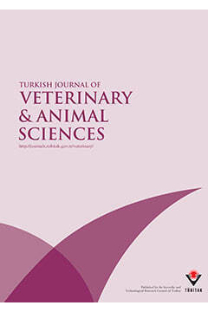Abdulkadir KESKİN, Hidir GENÇOĞLU, Gülnaz MECİTOĞLU, İsmail ÇETİN, Çağdaş KARA, Duygu Udum KÜÇÜKŞEN, Ebru BİLEN, Bariş GÜNER, Abdülkadir ORMAN, Ahmet GÜMEN
The effects of varying levels of dietary starch on reproductivetraits in lactating dairy cows
The aim of this study was to determine the effects of three different dietary starch levels on postpartum milk yield, blood metabolites, and reproductive traits in cows. A total of 23 primiparous Holstein-Friesian cows were fed three different diets including different starch levels on a dry matter basis from parturition until day 80. Cows were randomly assigned into the three groups according to the starch levels: low (LS, 16%, n = 7), medium (MS, 20%, n = 8), and high (HS, 24%, n = 8). Milk yields were recorded daily, and body condition score (BCS) was determined every week. Transrectal ultrasonography was performed, and blood samples were taken three times each week to determine reproductive traits and blood metabolites. Although the milk yield was greater in the LS group compared to the other groups, BCS and blood metabolites did not differ among the groups. The postpartum follicular patterns, times of first postpartum ovulation, and involution processes did not differ among the groups. In addition, the ovulatory follicle and corpus luteum sizes and the progesterone levels after induced estrus were numerically greater in HS than other groups. Thus, there were no effects of starch levels on postpartum reproductive traits.
Keywords:
Nutrition, starch, postpartum, reproductive traits, cow,
- ISSN: 1300-0128
- Yayın Aralığı: Yılda 6 Sayı
- Yayıncı: TÜBİTAK
Sayıdaki Diğer Makaleler
Mehmet ÇİFTÇİ, Ülkü Gülcihan ŞİMŞEK, Bestami DALKILIÇ, Mehmet Ali AZMAN, Ökkeş YILMAZ, Seda İflazoğlu MUTLU, Mehtap ÖZÇELİK, Yasin BAYKALIR, Fadime TONBAK, Muammer BAHŞİ
Tawheed Ahmad SHAFI, Baljinder Kumar BANSAL, Dhiraj Kumar GUPTA, Shashi NAYYAR
Abdollah SALEHI, Roya Rezaeian DOLOEI
Appraisal of the impact of aluminosilicate use on the health and performance of poultry
Hassan KERMANSHAHI, Abolghasem GOLIAN, Saeed SEIFI, Ali GILANI
Nobuko MORI, Eiji IWASAKI, Yuki OKADA, Toshiro ARAI, Koh KAWASUMI
Hossein EBRAHIMI, Shaban RAHIMI, Pejvak KHAKI, Jesse L. GRIMES, Sophia KATHARIOU
Ebru YILDIRIM, Hüsamettin EKİCİ, Ender YARSAN
